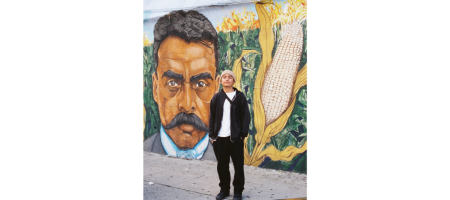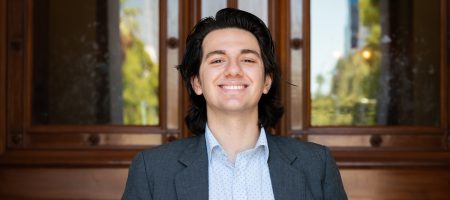Student Spotlight – Paula Zepeda
Meet UCLA undergraduate researcher Paula Zepeda!
Paula majors in Political Science, minors in Latin American Studies, and is part of the UCLA/Keck Humanistic Inquiry Undergraduate Research Awards program. The title of her project is “Inclusion and Exclusion in U.S. Immigration Rhetoric: Party, Constituency, and Co-Ethnicity in the House of Representatives.” Paula’s research brings forth a new perspective on legislative behavior encompassing the underlying racial bias embedded in the political system and a deeper understanding of the driving factors influencing legislators’ decisions on federal immigration bills. Her best piece of advice is to embrace your curiosity and actively engage with new information from a variety of sources.
How did you first get interested in your research project?
After taking Political Science classes covering topics like Latino Politics and news media, I became fascinated with the effects Latinos have had in transforming the American political landscape and the harm politicians inflict on minority groups when restricting them into stereotypes, thus increasing my curiosity to study the existing tensions between race/ethnicity and American politics in my research project. I was introduced to academic research during my sophomore year when I worked as a research assistant to graduate students. I am a first-generation Latina student, and those experiences have been valuable in introducing me to a new area in academia that I previously never knew about before becoming a UCLA student. I decided to apply to the Departmental Honors Program for Political Science, and am grateful for the unique opportunity that this program and the UCLA/Keck Humanistic Inquiry Undergraduate Research Awards program have provided me with to develop my thesis about U.S. House members’ immigration rhetoric amidst political polarization.
What has been the most exciting aspect of your research so far?
The most exciting aspect of my research has been examining the variety of sources that make information about Congressional actions and events accessible to read and watch. I have learned about website sources C-Span and Congressional Record that have bountiful information on speeches and debates that members of Congress have engaged in over the years. I can find videos dating back to the 1980s and compare the rhetoric past members have employed when speaking about immigration to the present day. Watching debates and speeches by members of Congress has been one of my favorite parts so far during this research process!
What has surprised you about your research or the research process?
I am surprised that during the research process, investigations, as well as revisions to one’s work, continue and never stop. I read scholarly articles daily to add to my thesis, and am always learning something new that strengthens my understanding of immigration rhetoric and legislative behavior. Ideas expand and they capture my attention because it enhances my ability to converse with the concepts in my arguments and theory.
What is one piece of advice you have for other UCLA students thinking about doing research?
Embrace your curiosity! Actively engage with the information provided in class, online, books, or even in conversations with family or friends by either challenging or questioning it because the academic field continues to grow. The contributions you can make in research add valuable knowledge to the ongoing scholarly debates, as well as to the greater community.
What effect do you hope your research has in your field, at UCLA, in your community, or in the world?
I hope my research brings forth a new perspective on legislative behavior encompassing the underlying racial bias embedded in the political system and a deeper understanding of the driving factors influencing legislators’ decisions on federal immigration bills. Immigration is one big topic of debate that Congress has disputed since its establishment in 1789. It continues to be a policy area where political parties are highly polarized and might resort to descriptions of immigrants as economic threats or criminals in order to justify their support behind restrictive immigration laws. I hope my research propels legislators to create arguments about immigration bills grounded in facts rather than assumptions because their legislative decisions on immigration impact various ethnic groups nationwide, especially Latinos, who embody the largest minority group in the United States, as well as undocumented immigrants who reside in the nation of immigrants where anti-immigrant sentiments persist.





